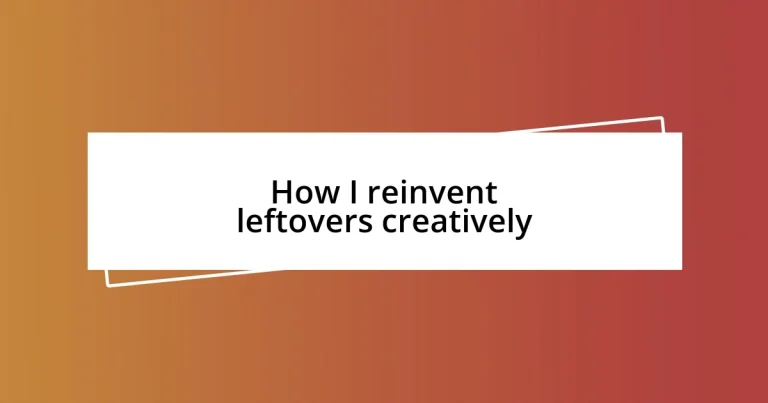Key takeaways:
- Leftovers can evoke nostalgia and inspire creativity, transforming them into new meals instead of viewing them as waste.
- Reinventing leftovers contributes to sustainability, saves money, and fosters a sense of accomplishment while enhancing family meals.
- Effective meal prep strategies, such as “leftover night,” encourage creativity and reduce food waste, demonstrating how a single ingredient can lead to diverse dishes.

Understanding Leftover Meals
Leftover meals often carry the weight of nostalgia; they remind me of family gatherings where there was always too much food and laughter that echoed long after the plates were emptied. I remember those moments fondly—the smell of my mom’s lasagna reheating in the oven the next day, filling our home with warmth and a sense of comfort. Have you ever felt that thrill when you open the fridge and discover something from the past that can spark joy all over again?
Interestingly, leftovers can also be seen as an opportunity for creativity in the kitchen. Instead of viewing them as mere remnants of a previous meal, I like to see each leftover as a new ingredient waiting to shine in its own dish. For instance, that half-eaten roast chicken can effortlessly transform into a zesty chicken salad or a comforting soup. It raises the question: how can everyday ingredients morph into something extraordinary with just a little imagination?
Leftovers can sometimes evoke a sense of guilt, as if we’re letting good food go to waste. Yet, I’ve learned that it’s less about the food itself and more about the potential it holds. The thrill of reinventing those meals has taught me to appreciate the value of every bite. With each transformation, I feel like I’m giving my meals a second life, making them matter all over again.

Benefits of Reinventing Leftovers
Reinventing leftovers offers a treasure trove of benefits that can elevate your cooking game. One of the most gratifying aspects is the reduction of food waste; it’s a small act that makes a big impact on the environment. I’ve noticed how my meals are not just culinary experiences but also contribute to sustainability. When I see that leftover stir-fried vegetables transformed into a vibrant omelet, I’m reminded of the delicious ways we can honor our resources.
Here are some key benefits of getting creative with leftovers:
- Saves Money: Using leftovers means less need to buy new ingredients, making meals for the week budget-friendly.
- Time Efficient: Reinventing leftovers often requires less cooking time, granting me more moments to spend with family or enjoy some leisure.
- Creative Exploration: Each leftover presents a chance to experiment with flavors and textures, sparking joy in the cooking process.
- Nutritional Boost: By combining different leftovers, I often find ways to increase the variety of nutrients in my diet without straining to plan out new meals.
- Sense of Accomplishment: There’s a powerful satisfaction in creating something new from what was already there, reminding me that I can turn limitations into innovation.
Every time I reinvent a meal, like when yesterday’s rice transforms into a flavorful fried rice bowl, it feels like a culinary adventure waiting to unfold. This practice has instilled in me a sense of resourcefulness and a deeper appreciation for the kitchen’s endless possibilities. It’s not just about the food; it’s about the stories we weave and the memories we create along the way.

Creative Recipe Ideas for Leftovers
Reinventing leftovers can feel like embarking on a culinary treasure hunt. For instance, last week, I turned some leftover quinoa and roasted vegetables into a vibrant salad. A squeeze of lemon, a drizzle of olive oil, and a sprinkle of feta transformed that dish into something my family couldn’t believe was originally a side. Isn’t it amazing how simple additions can create an entirely new experience from what might have otherwise been forgotten?
I often find inspiration in leftovers during a busy week when I need quick meal solutions. One memorable evening, I had some leftover spaghetti that I decided to toss with sautéed garlic, a handful of spinach, and a couple of eggs to make a frittata. The kids loved it, and I felt like a cooking magician. Stories like this remind me that leftovers can lead to delightful surprises and family bonding moments around the dinner table.
When it comes to reinventing leftovers, the possibilities are truly endless. Whether it’s repurposing stale bread into croutons for a hearty soup or blending leftover fruits into a refreshing smoothie, each creation highlights my belief that leftovers hold immense potential. I think about how I can craft a unique dish that’s still comforting and familiar.
| Leftover Ingredient | Creative Recipe Idea |
|---|---|
| Roast Chicken | Zesty Chicken Salad |
| Spaghetti | Spaghetti Frittata |
| Stale Bread | Homemade Croutons |
| Vegetable Stir-fry | Vibrant Veggie Omelet |
| Fruit | Refreshing Smoothie |

Ingredient Pairing Techniques
Ingredient pairing can truly be an art form, especially when it comes to transforming leftovers into new favorites. I often think about the balance of flavors and textures, which can lead to unexpected culinary masterpieces. For example, combining leftover roasted vegetables with grains like rice or farro not only enhances the dish’s heartiness but also creates a vibrant medley of colors that is simply inviting. Have you ever noticed how a dash of spice or a sprinkle of cheese can elevate even the simplest of combinations?
One technique I love is considering the primary flavor profile of the leftover ingredient. If I have some smoky grilled chicken, pairing it with tangy barbecue sauce or a fresh salsa can truly bring the dish to life. The combination creates a burst of flavors that feels so gourmet, yet it’s birthed from what was once a simple meal. That feeling – knowing that I can create something fabulous with just a little bit of creativity – makes cooking leftovers feel less like a chore and more like an adventure.
Another pairing technique I find effective is contrasting textures. For instance, if I have some soft, overripe tomatoes, I might blend them into a smooth sauce, then toss them with crispy roasted chickpeas for crunch. It’s that delightful interplay between soft and crunchy that keeps each bite exciting. Have you ever tried mixing a creamy leftover risotto with some crunchy greens? Trust me, the textures dance harmoniously, and that’s the sort of thing that keeps me coming back to my fridge for more culinary inspiration.

Presentation Tips for Leftover Dishes
When it comes to presenting leftover dishes, I always try to think about color and arrangement. Recently, I took some leftover ratatouille and placed it in a small cast-iron skillet, garnishing it with fresh basil. The vibrant colors and rustic presentation turned an ordinary dish into a visual feast, making my family curious about the meal. Have you ever noticed how a pretty presentation can make the food taste even better?
Using the right dish or plate can significantly enhance the visual appeal of your leftovers. I’ve discovered that white plates create a beautiful contrast, making colorful dishes pop. Just the other day, I served a colorful leftover stir-fry on a white platter, and it looked like a work of art. It’s fascinating how the right backdrop can elevate even the simplest of meals, isn’t it?
I also like to add finishing touches that can really make a leftover dish shine. A drizzle of balsamic glaze or a sprinkle of microgreens can take a simple leftover pasta to new heights. The first time I added edible flowers to a leftover salad, I felt like a gourmet chef! The little extras not only enhance flavor but also show that even leftovers can be elevated to a fine dining experience at home. Isn’t it rewarding to transform what seems ordinary into something extraordinary?

Meal Prep Strategies for Leftovers
Meal prepping with leftovers is all about creative reuse and planning ahead. I often dedicate a specific day each week to make sure I tackle my refrigerator’s contents. One approach I’ve found beneficial is to designate one compartment for leftover ingredients—like half a block of cheese or extra veggies. This way, I can easily scan what I have and concoct a new meal. Have you ever noticed how that little visual reminder can spark a ton of inspiration?
Another strategy I like is to prepare a “leftover night” where I invite my family to join in and use what we have. It turns into a fun culinary challenge! We gather all the leftover ingredients on the counter, and everyone gets a turn to create a dish. The last time we did this, my partner transformed some roasted potatoes and grilled peppers into delicious stuffed quesadillas, while I whipped up a creamy leftover broccoli soup. Engaging in this communal cooking not only reduces waste but also fosters creativity in the kitchen—try it, and you might discover unexpected combinations that everyone loves!
When it comes to meal prep, I also enjoy making big batches of versatile components that can be easily transformed. For instance, cooking a large pot of quinoa on Sunday sets me up for success throughout the week. I can toss in leftover roasted vegetables for a quick salad or mix it with a can of beans for a satisfying lunch. Isn’t it amazing how a single base ingredient can lead to a rainbow of meals? This kind of strategy not only saves time but also keeps my meals fresh and exciting, even when using leftovers.

Sustainability and Reducing Food Waste
Reducing food waste is incredibly important to me, and I often think about the impact my cooking choices have on the environment. Just the other week, I discovered that over one-third of the food produced globally goes to waste. This realization sparked a renewed passion in me to creatively reinvent my leftovers. Have you ever calculated how much food you toss out? It can be staggering to think about the energy and resources wasted.
In my own kitchen, I’ve become quite the experimental artist with scraps. For instance, I had a bunch of wilting herbs and some slightly stale bread. Instead of discarding them, I made a delightful herb pesto that enlivened my leftover grilled vegetables. Sharing this dish with friends not only filled our bellies but also sparked conversations about reducing waste—we all felt a sense of satisfaction knowing we had transformed what might have been thrown away into something delicious. Isn’t it rewarding to turn potential trash into treasure?
Moreover, I love involving my family in this sustainability journey. Recently, we transformed leftover rice into a flavorful risotto, infusing it with roasted vegetables and fresh herbs. Watching my kids take pride in recycling ingredients sparked a spark of creativity in them, too. It’s fascinating how engaging others in these small actions can lead to a collective mindset shift about waste. What if we all took a moment to reimagine leftovers? The possibilities could be endless!














